Books
Books

(Home Works) – A Cooking Book
Jens Strandberg, Jenny Richards
Home Works – A Cooking Book: Recipes for Organising with Art and Domestic Work, expands on cooking with art and food as a process for coming together and building collectivity. The book highlights the art and politics of eating together through a number of artistic, curatorial and tasty dinner recipes. Recipes that nourish and nurture conversations around domestic labour, collaborative practices and feminist politics, expanded upon through a series of essays and interviews.
The recipes were learnt during the cooking of Home Works; a research and exhibition programme investigating domestic labour and the politics of the home, hosted by the art space Konsthall C in Stockholm 2015-2017.
Home Works – A Cooking Book is a tool for everyone that wants to use art to challenge what work we value and how work is organised.
With contributions by: Samira Ariadad, Jonna Bornemark, Marie Ehrenbåge, Silvia Federici, Sandi Hilal, Dady de Maximo, Temi Odumosu, Jenny Richards and Jens Strandberg, Khasrow Hamid Othman, Halla Þórlaug Óskarsdóttir.

Poësy Matters and Other Matters (2 vol.)
The first comprehensive publication of the Swedish polymath Catherine Christer Hennix's written work in a two-volume set.
Volume one, Poësy Matters, is divided into two sections: poetry and drama, with each section also containing pieces of commentary by Hennix or her longtime collaborator Henry Flynt. Volume two, Other Matters, is divided into two sections: first, program notes and essays about a wide range of topics (including music, psychoanalysis, and mathematics), and second, a reproduction of Hennix's 1989 work The Yellow Book. The first comprehensive publication of Hennix's written work, Poësy Matters and Other Matters illustrates the singular depth and variety of her contributions to contemporary music, art, literature, and mathematics.
The texts in Poësy Matters and Other Matters reflect Hennix's diverse training as well as her long-standing personal interests in Lacanian psychoanalysis and Japanese and Middle Eastern poetic forms, resulting in a rich, diffuse collection of writings that reveal one of the avant-garde's most implacable, not to mention overlooked, creative minds.
Best known as a composer, Catherine Christer Hennix (1948, Stockholm – 2023, Istanbul) has, throughout her fifty-plus-year career, produced innovative work in the fields of not just minimal and computer music, but psychoanalytic theory, intuitionist mathematics, poetry, and prose as well.
Edited and introduced by Lawrence Kumpf.
English edition
17 x 24 cm (2 individual books, packaged together)
311 + 448 pages (ill.)
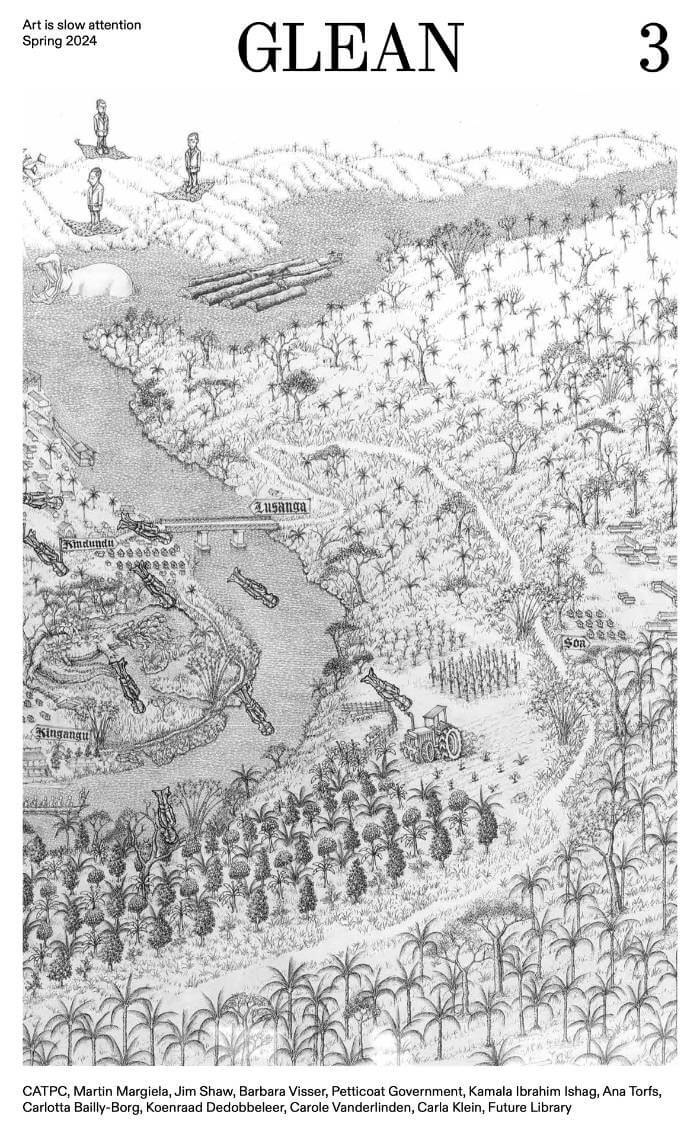
GLEAN - Issue 3 (ENG edition)
The third issue of English edition of GLEAN magazine.
With CATPC, Martin Margiela, Jim Shaw, Barbara Visser, Petticoat Government, Kamala Ibrahim Ishag, Ana Torfs, Carlotta Bailly-Borg, Koenraad Dedobbeleer, Carole Vanderlinen, Carla Klein, Future Library.

Time has fallen asleep in the afternoon sunshine
Appendix #1: The gesture of writing
Victoria Pérez Royo, Léa Poiré and 1 more
The Appendixes #1-4 is an editorial series by Mette Edvardsen, Léa Poiré and Victoria Pérez Royo that came out of the project Time has fallen asleep in the afternoon sunshine. For a two-year residency at Les Laboratoires d'Aubervilliers (2022-23), they came together as a small work group, shaping the work process, hosting presentation formats and making the publication series on paper as four cahiers.
The cahiers comprise a collection of commissioned texts and contributions created for this context, selected documents and traces from work sessions and encounters organized during the residency, texts read together and republished for this occasion, a collection of references, notes in progress, unfinished thoughts and loose fragments - on paper, between pages.
p 5-7 Almost on my way to you
p 8-10 Presque en route vers toi
Laía Argüelles Folch
p 12-13 Exercise in translation of Breve ensayo sobre la carta (Brief essay on the letter) by Laía Argüelles Folch
p 14-15 Exercice de traduction de Breve ensayo sobre la carta (Bref essai sur la lettre) de Laía Argüelles Folch
Quim Pujol, Paula Caspão, Simon Asencio, Pascal Poyet, Mette Edvardsen, Léa Poiré, Victoria Pérez Royo & Laía Argüelles Folch
p 16-17 Like a dinosaur upon awakening
p 18-19 Comme un dinosaure au réveil
Pascal Poyet
p 20-23 Is she a translator?
p 24-27 Est-elle traductrice?
Olivia Fairweather
p 28-29 New edition revised by my author
p 30-31 Nouvelle édition revue par mon auteur
Léa Poiré
p 32 Notes from a translation in progress
p 33 Notes d'une traduction en cours
Kate Briggs
p 34-37 Mothers & tongues
p 38-41 Langues (maternelles)
Mette Edvardsen
p 42-43 Collective reading of Finnegans Wake by James Joyce
p 44-45 Lecture collective de Finnegans Wake de James Joyce
Dora García and readers, et les lecteur·rices
p 46-49 Notes for a talk that did not happen
p 50-53 Notes pour une conférence qui n'a pas eu lieu
Olivia Fairweather
p 54-65 Meticulous comparison of two books with their versions rewritten from memory, excerpts from a work document
Comparaison méticuleuse de deux livres avec leurs versions réécrites de mémoire, extraits d'un document de travail
Julián Pacomio & Ángela Millano

Time has fallen asleep in the afternoon sunshine
Appendix / Appendice #4: Translation / Traduction
Mette Edvardsen, Léa Poiré and 1 more
The Appendixes #1-4 is an editorial series by Mette Edvardsen, Léa Poiré and Victoria Pérez Royo that came out of the project Time has fallen asleep in the afternoon sunshine. For a two-year residency at Les Laboratoires d'Aubervilliers (2022-23), they came together as a small work group, shaping the work process, hosting presentation formats and making the publication series on paper as four cahiers.
The cahiers comprise a collection of commissioned texts and contributions created for this context, selected documents and traces from work sessions and encounters organized during the residency, texts read together and republished for this occasion, a collection of references, notes in progress, unfinished thoughts and loose fragments - on paper, between pages.

Joan of Arkansas
Joan of Arkansas is an election-season closet drama about climate catastrophe, divine gender expression, the instructions of angels, and heavenly revelation relayed via viral video. Fifteen-year-old Joan has been tasked by God (They/Them) to ensure that Charles VII (R–Arkansas) adopts radical climate policy and wins his bid as the Lord’s candidate to become the president of the United States. Arkansas is flooding, the West is burning, and borders are closed: “Heaven or / internet—it’s / hard to be / good.”
Winner of the 2023 Whiting Award for Drama.

Read Me: Selected Works
Read Me gathers the tools necessary to make sense of contemporary problems so ubiquitous they seem too big to name. Spanning a multiplicity of genres, media, and tonal registers, this book surveys Holly Melgard’s formally experimental poetic works produced between 2008 and 2023, including sound poems, essays on poetics, and books that exploit print on demand to, for example, counterfeit money. In often wildly comic turns of thought, Melgard’s work cleaves personal agency from automated defaults by mapping trauma and technocracy from the inside out.
From critical talks to fictional monologues, the poet translates into language the unremarkable torments of neoliberalization in the digital age.
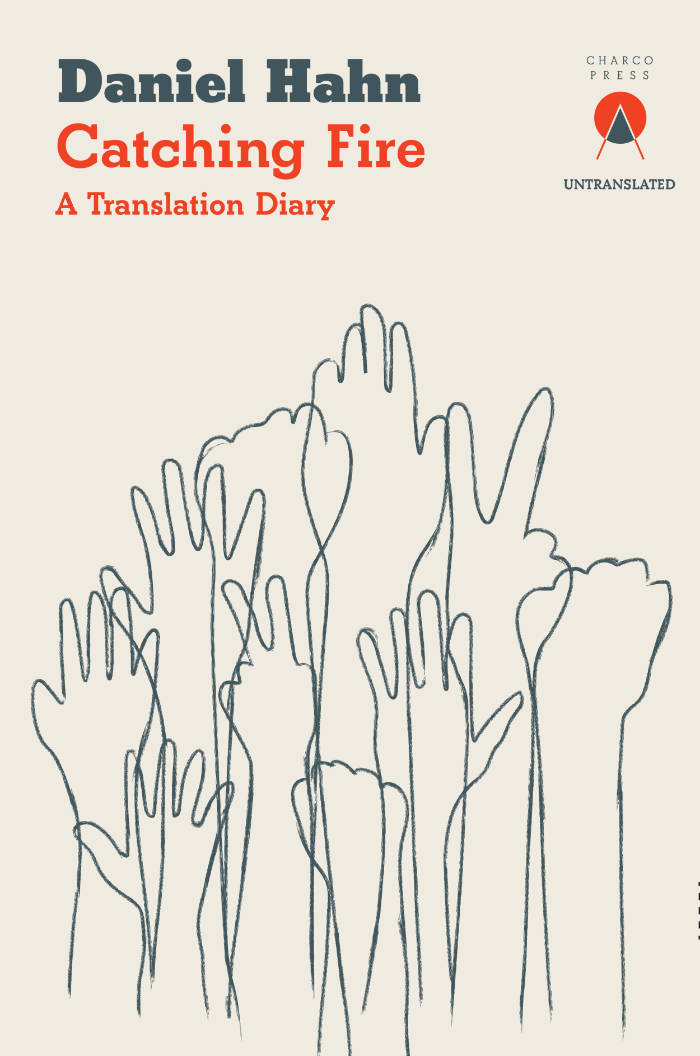
Catching Fire
In Catching Fire, the translation of Diamela Eltit's Never Did the Fire unfolds in real time as a conversation between works of art, illuminating both in the process. The problems and pleasures of conveying literature into another language—what happens when you meet a pun? a double entendre?—are met by translator Daniel Hahn's humour, deftness, and deep appreciation for what sets Eltit's work apart, and his evolving understanding of what this particular novel is trying to do.
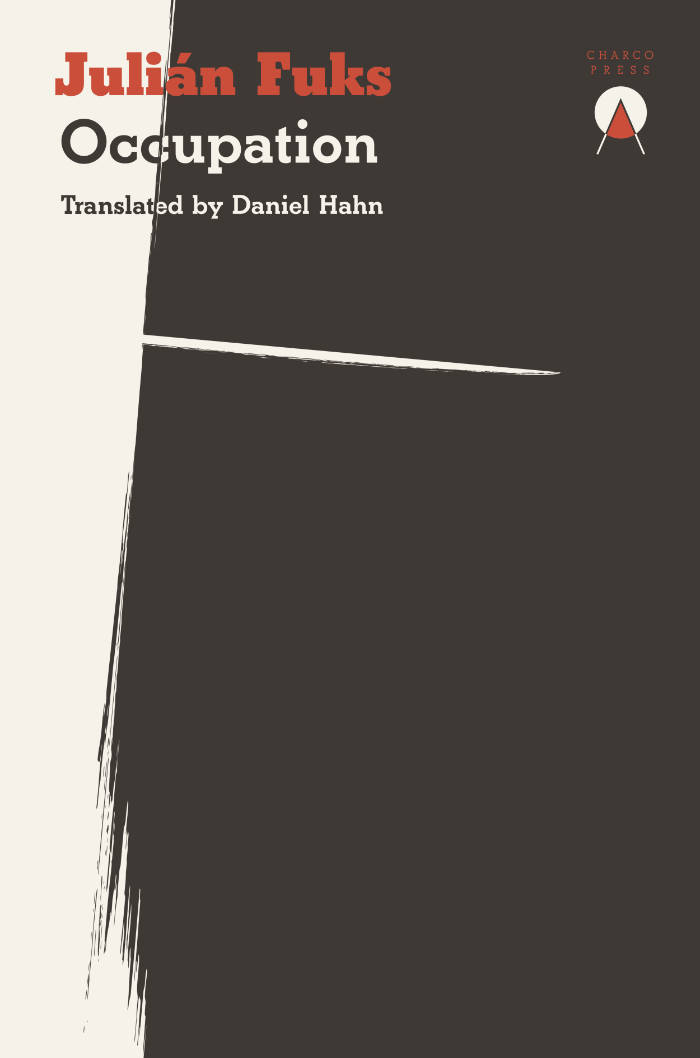
Occupation
Known and celebrated in Brazil and abroad for his novel Resistance, Julián Fuks returns to his auto-fictional alter ego Sebastián in a narrative alternating between the writer’s conversations with refugees occupying a building in downtown São Paulo, his father’s sickness, and his wife’s pregnancy. With impeccable prose, the author builds associations that go beyond the obvious, not only between glimpsing a life's beginning and end, but also between the building’s occupation and his wife's pregnancy — showcasing the various forms of occupation while exposing the frailty of life, the risk of solitude and the brutality of not belonging.

Split Tooth (Uk edition)
Fact can be as strange as fiction. It can also be as dark, as violent, as rapturous. In the end, there may be no difference between them. An Inuk girl grows up in Nunavut, Canada, in the 1970s. She knows joy, and friendship, and parents’ love. She knows boredom, and listlessness, and bullying. She knows the tedium of the everyday world, and the raw, amoral power of the ice and sky, the seductive energy of the animal world. She knows the ravages of alcohol, and violence at the hands of those she should be able to trust. She sees the spirits that surround her, and the immense power that dwarfs all of us.
When she becomes pregnant, she must navigate all this.
In this acclaimed debut novel – haunting, brooding, exhilarating, and tender all at once – Tanya Tagaq explores the grittiest features of a small Arctic town and the electrifying proximity of the worlds of animals and of myth.
Winner of the 2019 Indigenous Voices Award for Published Prose in English.
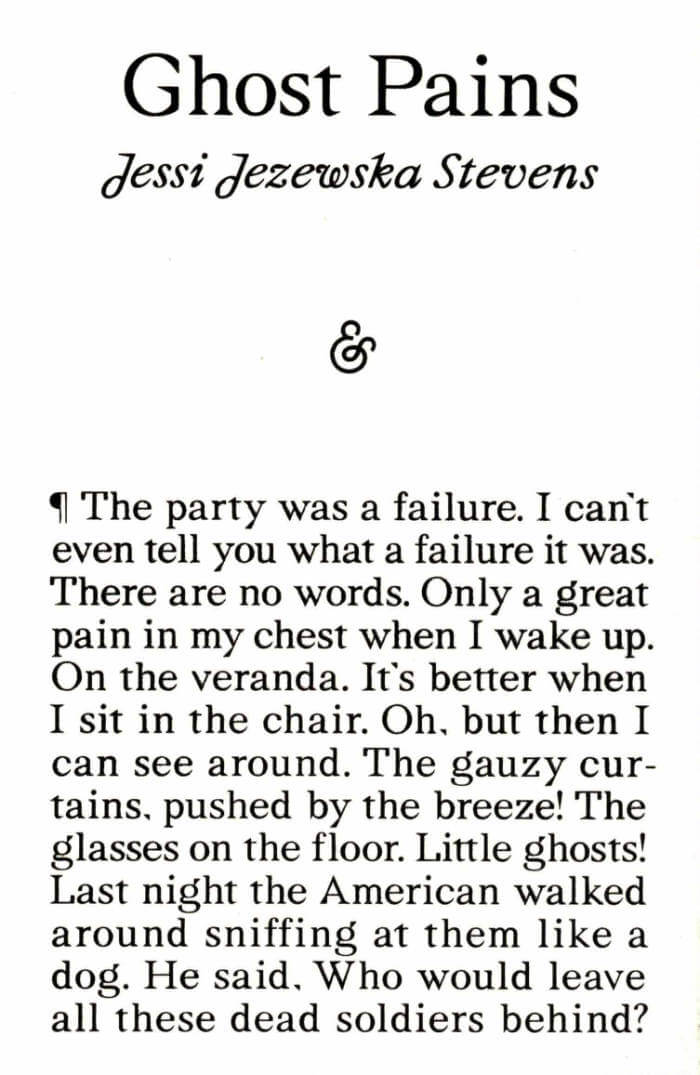
Ghost Pains
With her novel The Visitors, Jessi Jezewska Stevens has proven herself as our preeminent purveyor of comical, techno-millenarian unease. Now, with this first collection of her acclaimed short fiction – originally appearing in such venues as The Paris Review and Harper’s – some of her very best work is at last readily available to readers.
Stevens’s women throw disastrous parties in the post-party era, flirt through landscapes of terror and war, and find themselves unrecognisable after waking up with old flames in new cities. They navigate the labyrinths of history, love, and ethics in a fractured American present, seeing first-hand how history influences the ways in which we care for – or neglect – one another.
With each story exemplifying Stevens’s ability to examine the big questions through the microscope of a shambolic human perspective, Ghost Pains is a triumphant statement of purpose from one of our greatest young writer-thinkers.

Boulder
Working as a cook on a merchant ship, a woman comes to know and love Samsa, a woman who gives her the nickname ‘Boulder’. When Samsa gets a job in Reykjavik and the couple decides to move there together, Samsa decides that she wants to have a child. She is already forty and can’t bear to let the opportunity pass her by. Boulder is less enthused, but doesn’t know how to say no – and so finds herself dragged along on a journey that feels as thankless as it is alien.
With motherhood changing Samsa into a stranger, Boulder must decide where her priorities lie, and whether her yearning for freedom can truly trump her yearning for love.
Once again, Eva Baltasar demonstrates her pre-eminence as a chronicler of queer voices navigating a hostile world – and in prose as brittle and beautiful as an ancient saga.
Shortlisted for the 2023 International Booker Prize.
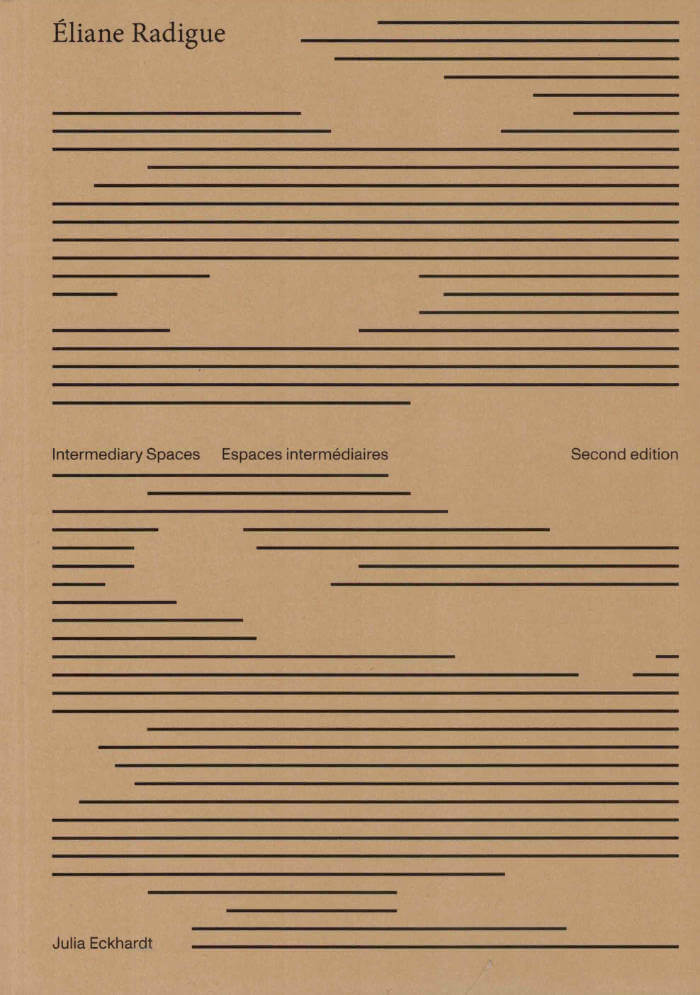
Intermediary Spaces (2nd edition)
Julia Eckhardt, Éliane Radigue
In the long interview that forms the body of this publication, Éliane Radigue talks about her work, her reflections and underlying research, as well as her historical context. The publication also contains a commented list of works and Radigue's programmatic text on The Mysterious Power of the Infinitesimal.
New expanded edition of the book first published in 2019.
Éliane Radigue (born 1932 in Paris) is considered one of the most innovative and influential contemporary composers, from her early electronic music through to her acoustic work of the last fifteen years. Influenced by musique concrète and shaped by regular sojourns in the United States, where she discovered analogue synthesisers, her work unfolds an intensity which is at once subtle and monumental. Through her deep reflections on sound and listening, not only her music but also her working methods have come to shape a widely resonating set of new parameters for working with sound as musical material.
Julia Eckhardt is a musician and curator in the field of the sound arts. She is a founding member and artistic director of Q-O2 workspace in Brussels, for which she conceptualized various thematic research projects. As a performer of composed and improvised music she has collaborated with numerous artists, and extensively with Eliane Radigue. She has performed internationally, and released a number of recordings. She has been lecturing about topics such as sound, gender and public space, and is (co-)author of The Second Sound, Conversation on Gender and Music, Grounds for Possible Music, and The Middle Matter, Sound as Interstice.
Edited by Julia Eckhardt.
Texts by Éliane Radigue and Julia Eckhardt.
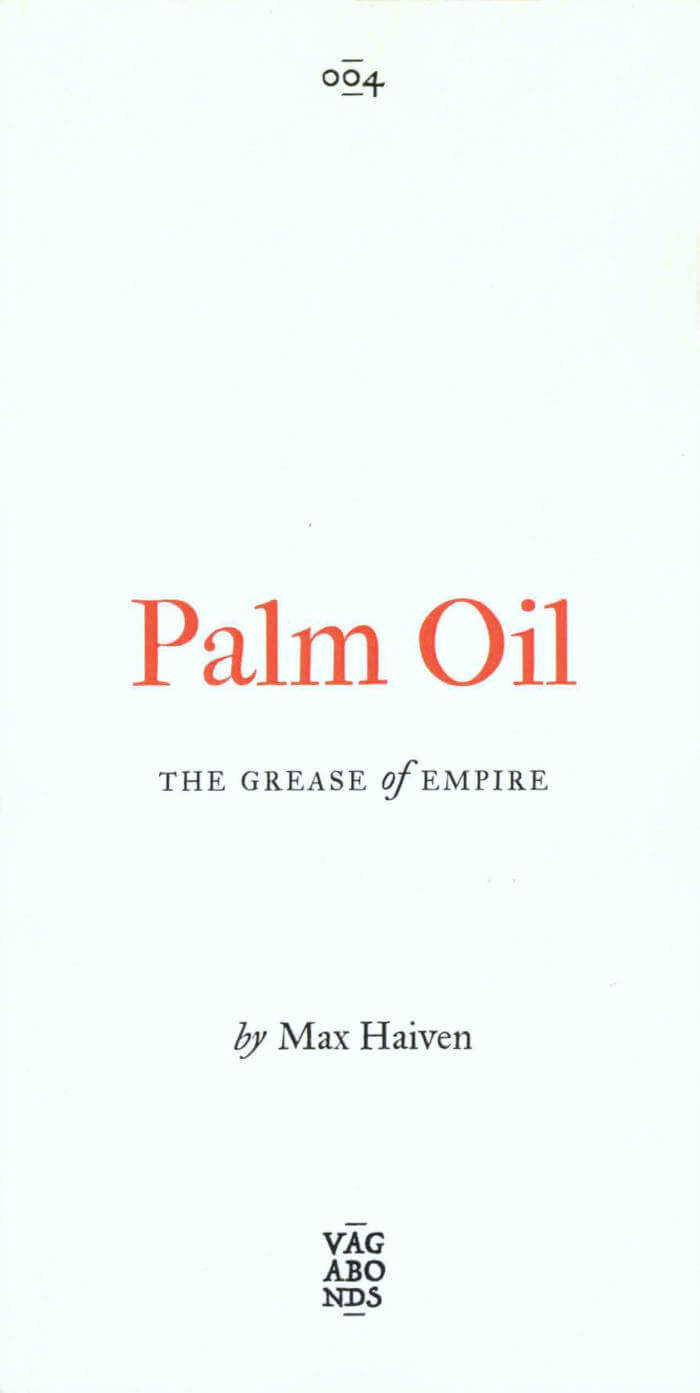
Palm Oil: The Grease of Empire
It's in our food, our cosmetics, our fuel and our bodies. Palm oil, found in half of supermarket products, has shaped our world. Max Haiven uncovers how the gears of capitalism are literally and metaphorically lubricated by this ubiquitous elixir.
From its origins in West Africa to today's Southeast Asian palm oil superpowers, Haiven's sweeping, experimental narrative takes us on a global journey that includes looted treasures, the American system of mass incarceration, the history of modern art and the industrialisation of war. Beyond simply calling for more consumer boycotts, he argues for recognising in palm oil humanity's profound potential to shape our world beyond racial capitalism and neo-colonial dispossession.
One part history, one part dream, one part theory, one part montage, this kaleidoscopic and urgent book asks us to recognise the past in the present and to seize the power to make a better world.
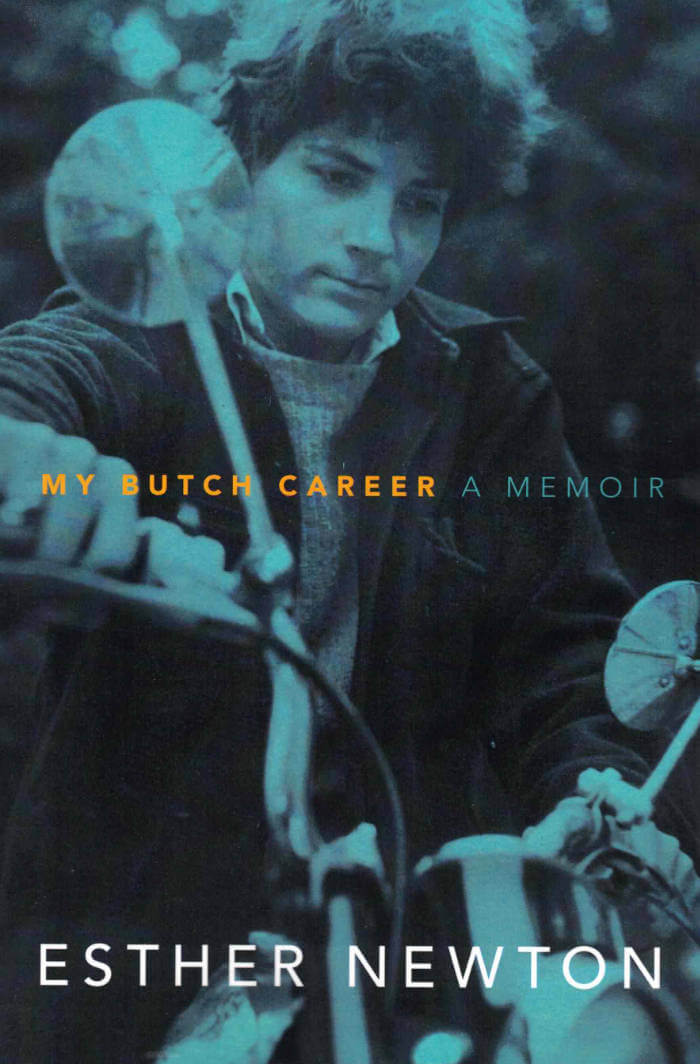
My Butch Career: A Memoir
In My Butch Career Newton tells the compelling, disarming, and at times sexy story of her struggle to write, teach, and find love, all while coming to terms with her identity during a particularly intense time of homophobic persecution in the twentieth century.
During her difficult childhood, Esther Newton recalls that she “became an anti-girl, a girl refusenik, caught between genders,” and that her “child body was a strong and capable instrument stuffed into the word ‘girl.’” Later, in early adulthood, as she was on her way to becoming a trailblazing figure in gay and lesbian studies, she “had already chosen higher education over the strongest passion in my life, my love for women, because the two seemed incompatible.”
Newton recounts a series of traumas and conflicts, from being molested as a child to her failed attempts to live a “normal,” straight life in high school and college. She discusses being denied tenure at Queens College—despite having written the foundational Mother Camp—and nearly again so at SUNY Purchase. With humor and grace, she describes the influence her father Saul's strong masculinity had on her, her introduction to middle-class gay life, and her love affairs—including one with a well-known abstract painter and another with a French academic she met on a spur-of-the-moment trip to Mexico and with whom she traveled throughout France and Switzerland. By age forty, where Newton's narrative ends, she began to achieve personal and scholarly stability in the company of the first politicized generation of out lesbian and gay scholars with whom she helped create gender and sexuality studies.
Affecting and immediate, My Butch Career is a story of a gender outlaw in the making, an invaluable account of a beloved and influential figure in LGBT history, and a powerful reminder of just how recently it has been possible to be an openly queer academic.

Worms #8 'The Elements Issue'
In this special edition, double-cover issue of Worms, we bring you not one, but two cover stars. The indelible Tyson Yunkaporta and the iconic Anne Waldman adorn both sides of Worms 8 which can also be thought of as ‘The Elements Issue’. It was dreamt up in a dreary and grey August in London, while the rest of the world suffered through the hottest days on record. As we witnessed, and continue to witness, such climate catastrophe, we turned to the literature we love to help us understand, to challenge us, and to offer us some comfort.
The issue is split into four sections—earth, fire, air and water—but its roots and webs push beyond what we typically think of as ‘the natural’: tales from the kitchen from Rebecca May Johnson and Slutty Cheff, reflections on gardening and colonialism, writer's block and clogged pipes, how to blow up pipelines with Andreas Malm, grief and writing, recovery and nature with Octavia Bright, social mobility with Isabel Waidner, the wide range of issues raised by the underrepresentation of First Nations people in literature with Evelyn Araluen and much, much more.
We hope that this issue can be a flame of hope, inspiration, or something that simply sustains in such turbulent times.
Featuring
Tyson Yunkaporta, Isabel Waidner , Jamaica Kincaid, Melissa Broder , Evelyn Araluen, Bruce Pascoe, Octavia Bright, Nora Treatbaby , Nerea Calvillo , Anne Waldman , Alexis Pauline Gumbs , Léuli Eshrāghi, Madeline Cash , Andreas Malm, Rebecca May Johnson
Contributors
Stella Murphy , Ben Redhead, Phoenix Yemi, Sam Moore, Devils Claws, Pierce Eldridge, Manon Mikolaitis, Caitlin McLoughlin, Isabel MacCarthy, Elodie Saint-Louis , Nettle Grellier, Amelia Abraham, Ryan Pfluger, Rose Higham-Stainton , Emma Crabtree, Ignota, Lydia Luke, Chloe Sheppard , Clem MacLeod , Carolyne Loreé Teston , Emma Cohen, Olive Couri, Raheela Suleman , No Land , Jacqueline Ennis-Cole , Sufia Ikbal-Doucet, Rhett Hammerton, Zara Joan Miller , Kate Morgan , Bug Shepherd-Barron, Zoe Freilich , Slutty Cheff , Clemmie Bache , Violet Conroy , Sarah White , Jemima Skala , Stephanie Francis-Shanahan

You spin me around: essays on music
Nathan O’Donnell, Niamh Dunphy and 1 more
You spin me round is an illuminating collection of essays, an essential mixtape that takes elements of music – songs, performances, albums, gigs – as points of departure. Some of the finest writers at work today reflect on what music has meant to them at different moments in their lives.
The writers sift through the material artefacts of their music worlds – torn ticket stubs, creased flyers, worsted wristbands – those items that slip out of a book or the back of a drawer, or that appear crumpled in the pocket of an old coat. You spin me round is a compilation of totems, a distillation of ineffable musical experiences.
With contributions by Ciaran Carson, Brian Dillon, Wendy Erskine, Aingeala Flannery, Peter Geoghegan, Colin Graham, M. John Harrison, Tabitha Lasley, Declan Long, Jayne A. Quan, McKenzie Wark, and Sydney Weinberg.

BUTT magazine 34
This full-frontal 34th issue of BUTT has plenty of queer ringleaders, free speech and skin. Inside, find interviews with Hollywood doll Hari Nef, young gay historian Jason Okundaye, fashion phenom Jean-Pierre Blanc, literary outlaw Constance Debré and dark room connoisseur Frank Rediess of Berlin's Ficken 3000. It's stuffed even further with horny photo series by Kuba Ryniewicz and Paul Mpagi Sepuya, plus lots of spit-swapping, Arabic sexting and bottom architecture. Yes, please.
Spring 2024
From ass to architecture to ass architecture, this full-frontal issue of BUTT has plenty of queer ringleaders, free speech and cock. Yes, please.
JASON OKUNDAYE, gay historian shows crack
By Douglas Greenwood and Ajamu X
HARI NEF, Hollywood doll is literally one
By Zak Stone and Collier Schorr
DR. EVAN GOLDSTEIN, hole-care guru
By Michael Bullock and Marcelo Krasilcic
GRAY WIELEBINSKI & ASA SERESIN, transatlantic husbands
By Kuba Ryniewicz
FRANK REDIESS, dark room nocturne ft. Ficken 3000 boss
By Matt Lambert
MOUTHFUL, spit-swapping delight
By Chris Curreri
MARWAN KAABOUR, Levantine lad and sext specialist
By Evan Moffitt and Daniel Riera
HOTSHOTS, studio fucking
By Paul Mpagi Sepuya
CONSTANCE DEBRÉ, best-selling dyke
By Andrew Pasquier and Raphael Chatelain
PLAY, sublime foot fun
By Kuba Ryniewicz
JEAN-PIERRE BLANC, fashion phenom on naked island
By Gert Jonkers, Marc Turlan and Raphaël Chatelain

Famous for my Dinner Parties - Issue 001
After three years online, the Berlin-based food culture magazine ‘famous for my dinner parties’ is going paper! For this first edition zine, the team selected their favourite stories, essays, fun facts and photo series of the last few years, and threw some new bits and bobs into the mix, too. It’s about fake news and futurism, fast food and food faux pas, food fights, furious foodies and the best film ever made. It’s about things that look good and things that taste good, and also about things that leave a bitter taste in one’s mouth.
famous for my dinner parties is a magazine and platform celebrating, portraying, questioning and discussing different aspects of the culture around food and eating.

A Live Gathering: Performance and Politics in Contemporary Europe
The main question we raise with this book is how performance can be political in present day European representative democracy, a system which no longer draws on the live gathering of people. Several leading European (mostly female) thinkers analyse artistic practices that have emerged alongside new social movements – such as Solidarity in Greece or Municipalism in Spain – investigating how theatre, dance and performance respond to the new political insights and experiments. It is a context wherein the previously well-known tactics and tools, such as participation, identity politics or spontaneous usage of public space don’t suffice. Thus we must build and learn a new vocabulary of politicality of performance that includes opaque words such as ‘innervation’, ‘preenactment’, ‘prefiguration’ or ‘recreation’.
Part I : What is people’s gathering to democracy?
Part II : The new politicality of performance: the time of gathering, (re)creative labour and the domestic
Part III : Radiation Patterns of Performance
Contributors: Isabell Lorey, Bojana Cvejic, Bojana Kunst, Stina Nyberg, Ana Vujanovic, Giulia Palladini , Livia Andrea Piazza, Valeria Graziano, Florian Malzacher, Goran Sergej Pristaš, Silvia Bottiroli

Prayers Manifestos Bravery
First published in 2018, Prayers Manifestos Bravery is a collection of Verity Spott’s “Trans* Manifestos”. Written from 2011 and originally published on her blog, the book’s content ranges from concrete poetry to long-form dispatches, confessions and manifestos touching on questions of identity, gender, justice and society.
“This is a collection of attempted manifestos whose composition began in 2011. It does not pretend to be completed and any life it has is in its capacity for change, movement and instability. These manifestos are described as such because at the time of their composition they felt like attempts of preservation; of life and of the capacity to struggle against life. They are all improvisations. They have not been heavily edited, and they are untidy. We're unsure what we are." — preface by the author
Verity Spott is a poet, teacher and care worker from Brighton, England. She is the author of the books Gideon, Click Away Close Door Say, We Will Bury You, The Mutiny Aboard the RV Felicity, Prayers Manifestos Bravery, Poems of Sappho (in translation), Hopelessness, Coronelles Set 1 and 70 Sonnets. Verity's poetry has appeared in The New York Times and has been translated into French, German and Greek.

Blank Forms #06 – Organic Music Societies (hardcover)
Magnus Nygren, Naima Karlsson and 1 more
Archival documents and new writings on the intermedia collaborations of avant-garde jazz trumpeter Don Cherry and textile artist Moki Cherry.
Avant-garde jazz trumpeter Don Cherry and textile artist Moki Cherry (born Karlsson) met in Sweden in the late sixties. They began to live and perform together, dubbing their mix of communal art, social and environmentalist activism, children's education, and pan-ethnic expression “Organic Music.” Organic Music Societies, Blank Forms' sixth anthology, is a special issue released in conjunction with an exhibition of the same name devoted to the couple's multimedia collaborations. The first English-language publication on either figure, the book highlights models for collectivism and pedagogy deployed in the Cherrys' interpersonal and artistic work through the presentation of archival documents alongside newly translated and commissioned writings by musicians, scholars, and artists alike.
Introduction by Lawrence Kumpf & Magnus Nygren; texts by Keith Knox, Rita Knox, Bengt af Klintberg, Iris R. Orton, Åke Holmquist, Pandit Pran Nath, John Esam, Michael Lindfield, Sidsel Paaske, George Trolin, Alan Halkyard, Moki Cherry, Don Cherry, Ben Young, Christer Bothén, Bengt Berger, Fumi Okiji; interviews by Keith Knox & Rita Knox with Don Cherry, Terry Riley, Steve Roney.
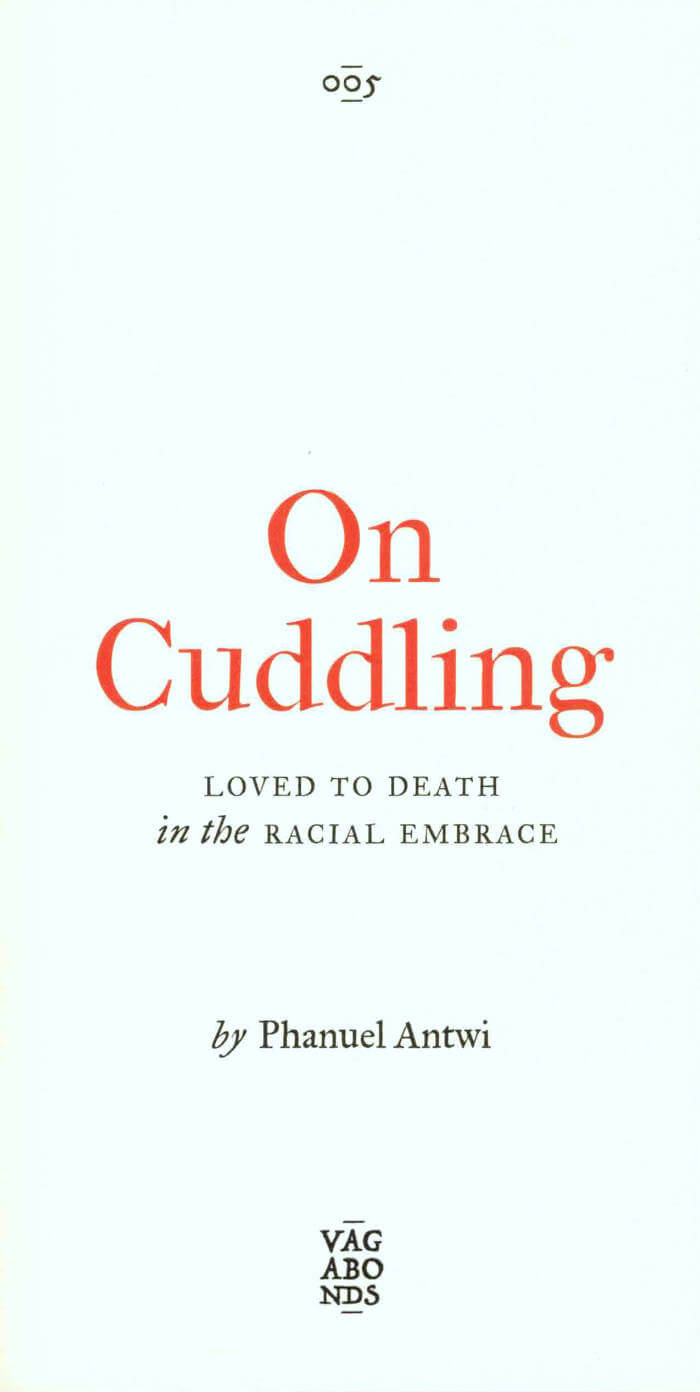
On Cuddling: Loved to Death in the Racial Embrace
Ranging from the terrifying embrace of the slave ship's hold to the racist encoding of 'cuddly' toys, On Cuddling is a unique combination of essay and poetry that contends with the way racial violence is enacted through intimacy.
Informed by Black feminist and queer poetics, Phanuel Antwi focuses his lens on the suffering of Black people at the hands of state violence and racial capitalism. As radical movements grow to advance Black liberation, so too must our ways of understanding how racial capitalism embraces us all. Antwi turns to cuddling, an act we imagine as devoid of violence, and explores it as a tense transfer point of power.
Through archival documents and multiple genres of writing, it becomes clear that the racial violence of the state and economy has always been about the (mis)management of intimacies, and we should face it with resistance and solidarity.
Phanuel Antwi is Canada Research Chair in Black Arts and Epistemologies. He is an artist, teacher and organiser concerned with race, poetics, movements, intimacy and struggle. He works with text, dance, film and photography to intervene in artistic, academic and public spaces. He is a curator, activist and associate professor at the University of British Columbia.
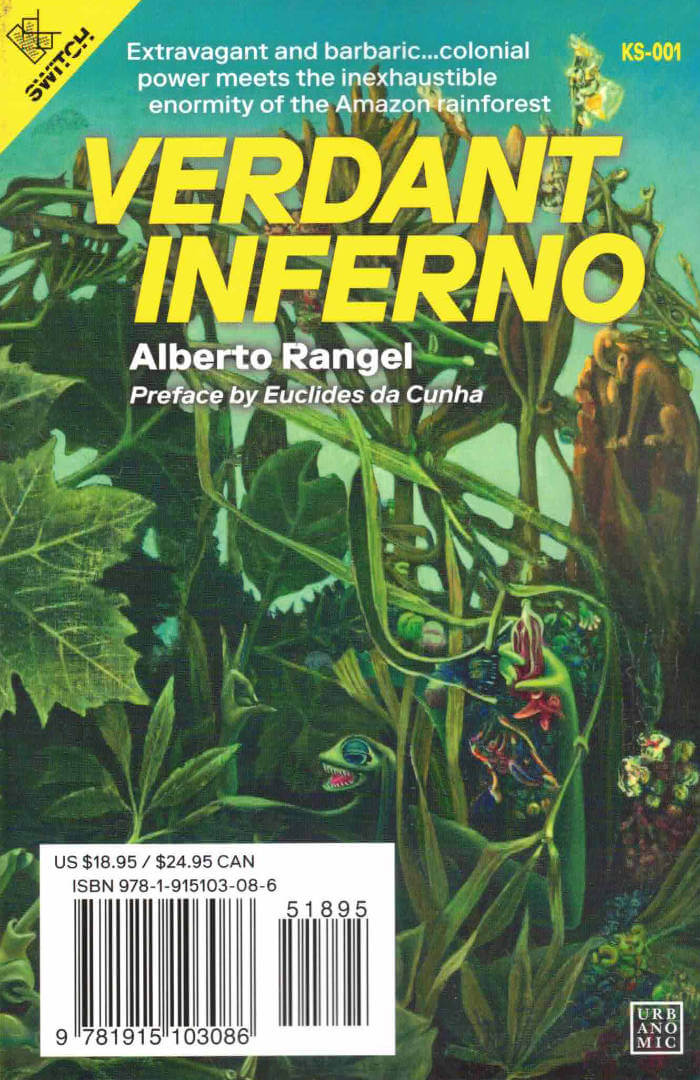
Verdant Inferno/A Scabby Black Brazilian
Alberto Rangel, Jean-Christophe Goddard
A classic of Brazilian literature is twinned with an overheated tract in which tropical delirium swallows up Western philosophy. Both attack the decolonial question with poetic ferocity, ignited by the moment when colonialist rationality meets its limits in the "magnificent disorder" of the Amazon jungle.
Described in Eduardo Viveiros de Castro's foreword as "no longer an interpretation of Brazil but an interpenetration with Brazil," Jean-Christophe Goddard's strange theory-fiction plunges Western philosophy into the great American schizophrenia, where its ordered categories are devored by uncontainable contaminations—first and foremost the rainforest itself, a "monstrosity unapproachable by the cogito."
In 1664, the Portuguese Bento de Espinosa wrote of his terrifying hallucination of "a scabby black Brazilian." But rather than a vision of "the Other," the dream figure was a frightful glimpse of Bento's own duplicity. Upon adopting the "clean white nickname" of Benedict de Spinoza, the philosopher cut ties with his homeland and its colonial misadventures, repudiating this specter that flees along the lines of migration: "Spinoza is American ... the journey is intensive." And in his wake, a cannibalized cast of conceptual personae are sucked into Goddard's Pernambucan delirium: Franny Deleuze, Dina Levi-Strauss, Chaya Ohloclitorispector, Galli Mathias...
The rainforest also precipitates a deregulation of the senses in Verdant Inferno, Alberto Rangel's classic 1904 work of Brazilian literature. In Rangel's astonishing tales, this "poet-engineer" sent into the dark interior as a state representative records his encounters in a style that shimmers between objective documentary and visionary limit experience.